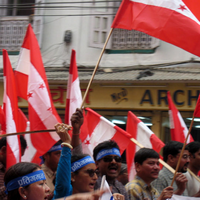The term of Nepal's Constituent Assembly, which was already extended for an extra year in May 2010, will likely come to an end on May 28 without the assembly having fulfilled its mandate to write a new constitution. Though it is easy to blame the country's bitterly divided political parties for the failure, there is actually some merit to the politicians' claim that they faced significant obstacles.
Nilamber Acharya, a leader of the opposition Nepali Congress party and chair of the Constitutional Committee, which was entrusted to finalize the first draft of the constitution, blames the delay on "so many unresolved issues, some of them fundamental in nature." These include disagreements over the country's form of government, its electoral system and its structure of federation.
At the root of the problem, according to Nepali author Manjushree Thapa, is an "ideological clash" between the traditional Nepali Congress and the radical Unified Communist Party of Nepal (Maoist), the two largest parties represented in the Constituent Assembly.

